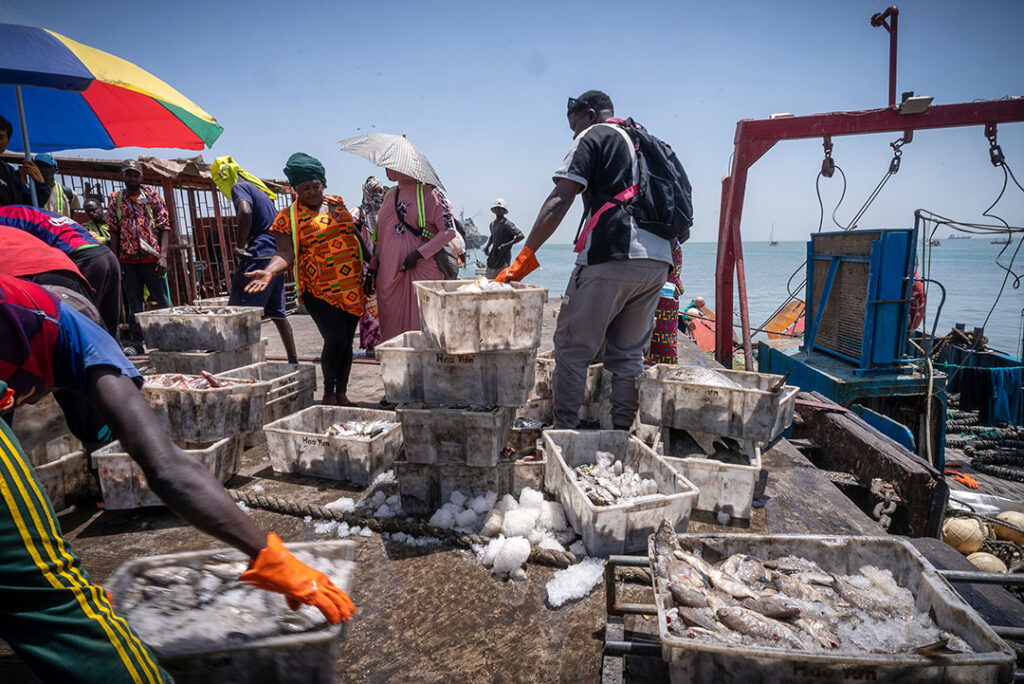Fury over fishing in The Gambia has reached a fever pitch. Now locals are feuding with foreign industrial trawlers in the country’s waters.
The Gambia’s government requires foreign vessels operating offshore to carry a percentage of local crew members, some of whom have been injured when Gambian fishermen attacked foreign trawlers fishing close to shore. Under Gambian law, foreign vessels must fish at least 9 nautical miles out to sea.
Kawsu Leigh was one of two Gambian crew members severely burned when angry locals attacked an Egypt-flagged trawler they worked on with burning stones last year. While one local fisherman faces trial over the attack, Leigh struggles to rebuild his life. He said most of his money is spent on medication to treat his injuries.
“I moved here. I go to hustle for my family. I have this accident. Yeah, I think my life is finished,” Leigh told The Associated Press (AP). “Seaman work is like prison, but we call it civilized prison. This job, no respect is there. We are going to risk our lives. I have two brothers, two sisters. If I don’t do nothing, they will not have nothing.”
The Association of Gambia Sailors provides foreign trawlers with Gambian crew members. Abdou Sanyang, the association’s secretary general, condemned the attack.
Such confrontations are “very dangerous,” Sanyang told the AP. “So, all these things are happening. It’s a sea war.”
Due to escalating violence, Sanyang argued for a rule that limits where local fishermen can fish.
“If you say these things, some people will say, ‘This man is mad,’” Sanyang said. “But that’s the only way out that we can have peace, that we cannot crash together.”
Omar Gaye, public relations officer with the Gambia Artisanal Fisheries Development Agency, advocates for the rights of local fishermen. He said Sanyang’s idea should not be implemented unless there are stricter limits on industrial trawlers, which have for decades pillaged the country’s waters, threatening the livelihoods of an estimated 200,000 people working in local fisheries. Coastal Gambian communities have relied on fishing for food and income for generations.
“You can’t stop these small fishing boats, which you know that they are going for their livelihood, day to day, and they are the ones who supply the market [with] fish,” Gaye told AP. “So, you cannot stop those people or regulate them whilst these [foreign trawlers] are doing whatever they want.”
A video obtained by AP showed a foreign industrial trawler chasing a much smaller artisanal fishing canoe as a person aboard the trawler threw rocks at it. Although the Gambian government does not track such incidents, AP viewed more than 20 videos showing confrontations between local boats and foreign trawlers since 2023. At least 11 local fishermen have been killed in at-sea confrontations over the past 15 years.
“They keep on killing us, there will be a big, big problem. Not small,” Gaye told AP. “They can’t stop us from fishing. They can’t.”
Many of the foreign fishing vessels in The Gambia and around West Africa are Chinese. China is the world’s worst illegal, unreported and unregulated fishing offender, according to the IUU Fishing Risk Index. Beijing’s presence in The Gambia has long been controversial. In 2021, protesters torched the Chinese-owned Nessim Fishing and Fish Processing Co. fishmeal factory, which was blamed for polluting the environment in Sanyang.
Locals say foreign vessels routinely cut the nets of artisanal fishermen, fish in prohibited areas, and implement destructive practices such as bottom trawling, which involves dragging a huge net along the ocean floor, indiscriminately scooping up all manner of marine life. The practice kills juvenile fish, decimates fish stocks and destroys ecosystems critical to the survival of marine life. This seriously depletes fish stocks, drives food insecurity and fuels local outrage.
“The fisheries situation in The Gambia is very, very fragile, and it is in very bad condition,” Lamin Jassey, president of the Gunjur Conservationists and Ecotourism Association, told AP. “That is our economy, and our livelihood and our right. We have the right to fish, we have the right to food. The majority of Gambians, 99%, depend on fish because it’s cheaper.”

